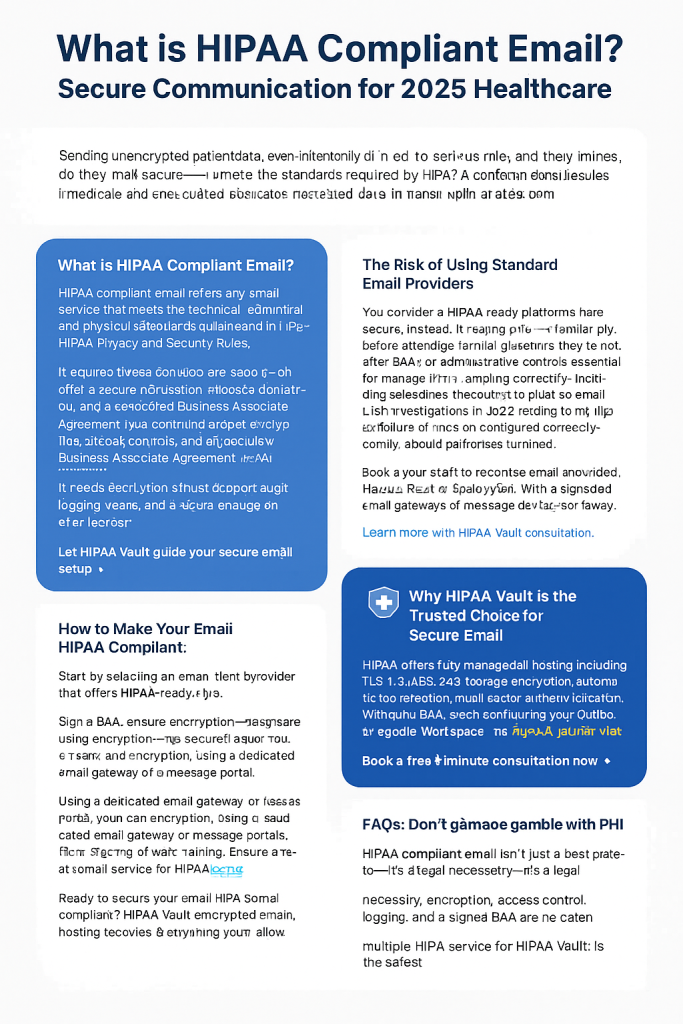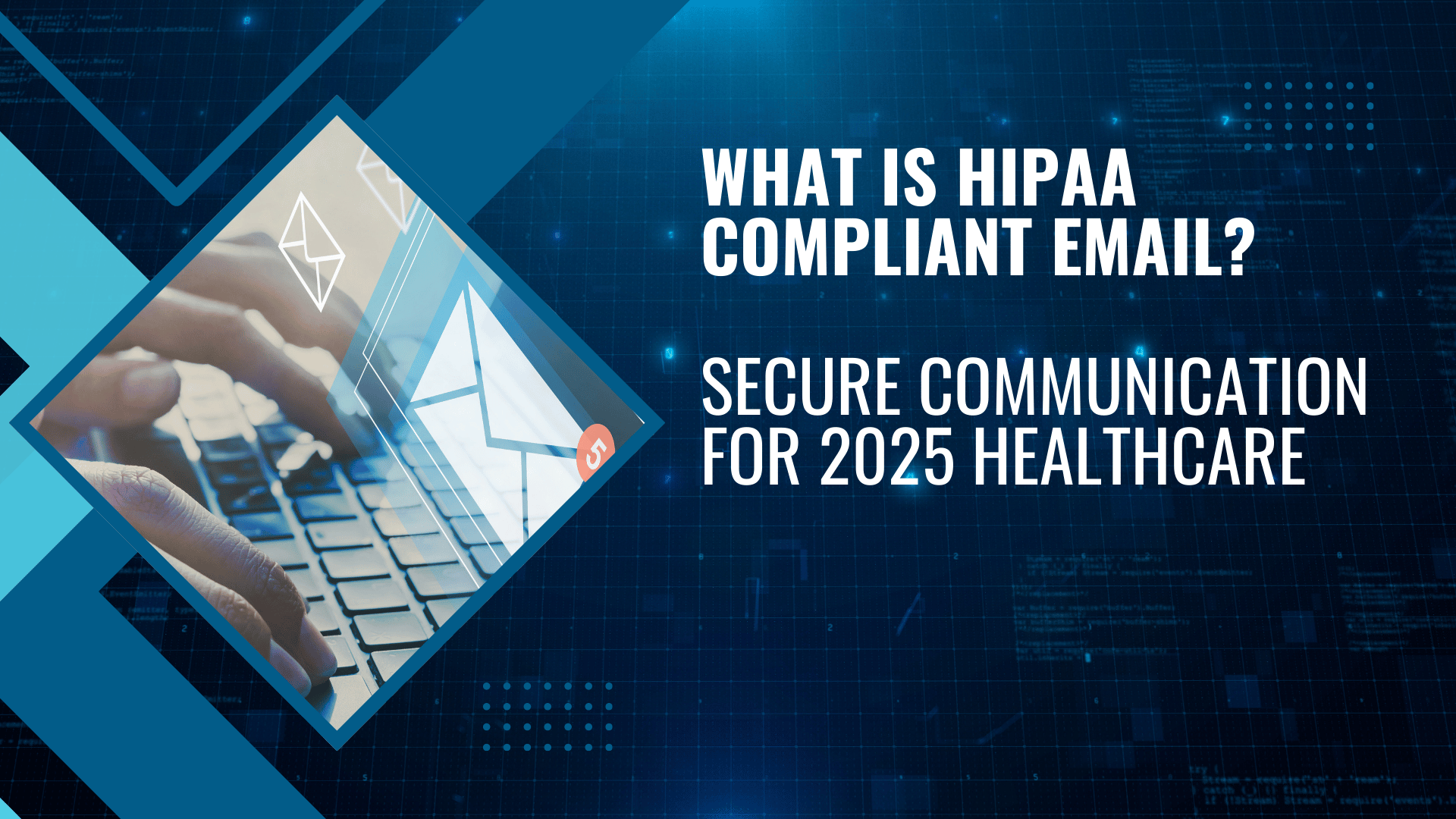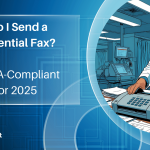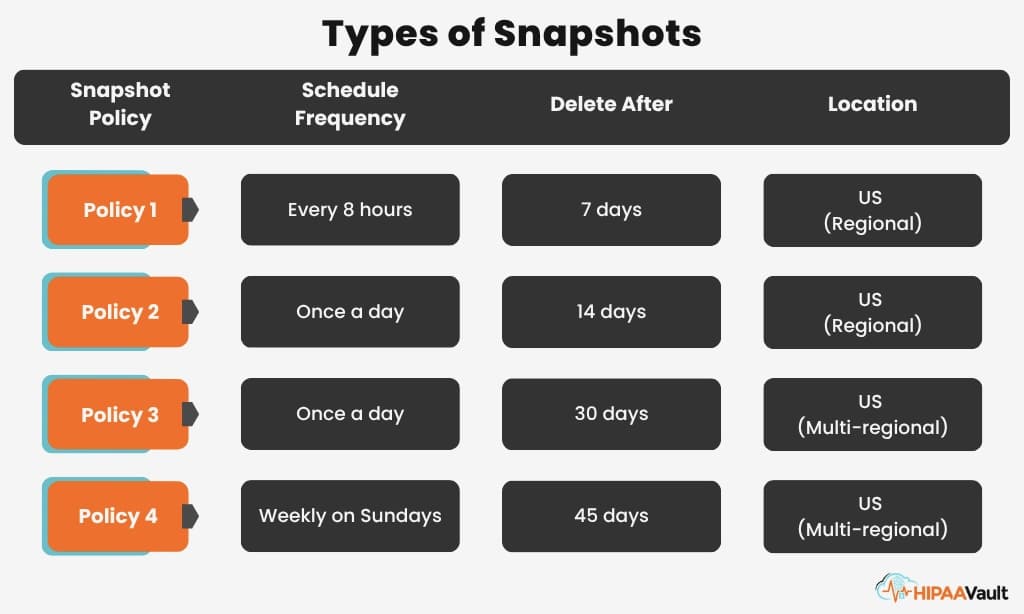Healthcare providers send protected health information (PHI) every day, often through email. But are those messages secure? And more importantly, do they meet the standards required by HIPAA?
Sending unencrypted patient data, even unintentionally, can lead to serious breaches and steep fines. The Department of Health and Human Services (HHS) enforces strict guidelines for how electronic PHI (ePHI) should be transmitted.
Need a HIPAA-compliant email setup right now? Learn more
What is HIPAA Compliant Email?
HIPAA compliant email refers to any email service that meets the technical, administrative, and physical safeguards outlined in the HIPAA Privacy and Security Rules.
Email itself is not banned under HIPAA. But if it’s used to transmit PHI, the platform must include proper encryption, access controls, and an executed Business Associate Agreement (BAA) between the email service provider and the healthcare organization.
According to HHS, HIPAA doesn’t mandate a specific technology. Instead, it requires that covered entities assess and implement reasonable safeguards to protect data in transit and at rest (HHS.gov Guidance on Email and HIPAA).
A compliant email system must also support audit logging, secure authentication, and a clear policy for message retention. Without these controls in place, even popular platforms like Gmail or Outlook may not be secure enough on their own.

Stop Sending PHI Over Unsecured Email
Protect your practice from data leaks. Our email service automatically encrypts sensitive patient information.
Learn MoreHIPAA Email Requirements for 2025
To qualify as HIPAA compliant, an email service must do more than offer a secure login.
First, it needs encryption during both transmission and storage. This typically means using TLS 1.2 or higher to protect data in motion, and AES-256 for data at rest. Emails containing PHI should never be sent unencrypted across public networks.
Second, the provider must sign a BAA. This legal contract ensures that the email host takes responsibility for protecting PHI according to HIPAA standards. Without a BAA, even technically secure platforms are considered non-compliant.
Third, access to email accounts must be controlled. This includes requiring strong passwords, enabling multi-factor authentication, and limiting access to authorized personnel.
Fourth, audit logs must be enabled and retained. Organizations should be able to trace who accessed what, when, and from where—especially in the event of a breach.
Need help confirming these requirements? Let HIPAA Vault guide your secure email setup
The Risk of Using Standard Email Providers
Many healthcare practices assume that because they use familiar platforms, they’re automatically secure. This assumption is dangerous.
Free versions of Gmail or Outlook do not offer HIPAA compliance. They lack BAAs and often don’t support the administrative controls necessary to manage PHI risk.
Even paid versions require configuration. For example, Microsoft 365 and Google Workspace can be HIPAA compliant, but only if set up correctly. This includes activating the BAA, disabling legacy protocols like IMAP and POP3, and enforcing encryption settings.
The penalties for non-compliance are significant. In 2023 alone, OCR investigations led to millions of dollars in fines for organizations that mishandled PHI—including email-based breaches.
Don’t take that risk. Partner with HIPAA Vault to configure your Outlook or Google Workspace the right way
How to Make Your Email HIPAA Compliant
Start by selecting an email hosting provider that offers HIPAA-ready infrastructure. This should include encryption, logging, and round-the-clock security monitoring.
Make sure the provider signs a BAA and that their service includes administrative support to help you configure the environment.
Ensure encryption is enforced both for stored messages and when they’re sent. Avoid using standard SMTP without secure wrappers, and disable features like auto-forwarding that could expose PHI.
Use a dedicated email gateway or message portal when sending sensitive information to patients. This allows recipients to access messages through a secure web interface, rather than receiving PHI directly in their inbox.
Train your staff to recognize phishing attempts, avoid accidental disclosures, and understand when it’s safe to email PHI.
Need a pre-configured, secure email solution? HIPAA Vault’s encrypted email hosting includes everything you need—from BAA to audit logs.
Why HIPAA Vault is the Trusted Choice for Secure Email
HIPAA Vault offers fully managed email hosting designed specifically for healthcare.
Our service includes end-to-end encryption using TLS 1.3, AES-256 storage encryption, and automatic log retention. Multi-factor authentication is enabled by default, and we monitor for anomalies 24/7 through our managed SOC.
We integrate with Google Workspace and Microsoft 365, so you can use the tools you already trust—without the compliance headache.
Most importantly, we sign a BAA and provide direct access to compliance consultants who will walk you through every step.
Ready to secure your email communications? Contact sales
Final Thoughts: Don’t Gamble with PHI
HIPAA compliant email isn’t just a best practice—it’s a legal necessity. If your organization sends or receives patient information over email, you must verify that your systems meet the HIPAA standard.
Encryption, access control, logging, and a signed BAA are non-negotiable. Falling short could expose patients to harm and your organization to fines or lawsuits.
HIPAA Vault makes compliance simple. With managed email hosting and hands-on support, you get peace of mind and avoid costly mistakes.
Book a 15-minute consultation now and let us secure your healthcare communications.
https://www.hipaavault.com/hipaa-compliant-email/
FAQs: HIPAA Email Compliance in 2025
Q: Does HIPAA require encrypted email?
A: HIPAA requires secure transmission of PHI. Encryption is the most accepted method to meet this requirement (HHS.gov Email Guidance).
Q: Can Gmail or Outlook be HIPAA compliant?
A: Only if you use Google Workspace or Microsoft 365, configure them properly, and have a signed BAA.
Q: What if a patient wants to receive email without encryption?
A: You must inform the patient of the risk and obtain written consent before sending PHI without encryption (per HHS guidance).
Q: What is the safest email service for HIPAA?
A: A managed HIPAA email provider like HIPAA Vault, with encryption, access controls, and a BAA, is the safest option for transmitting PHI.








